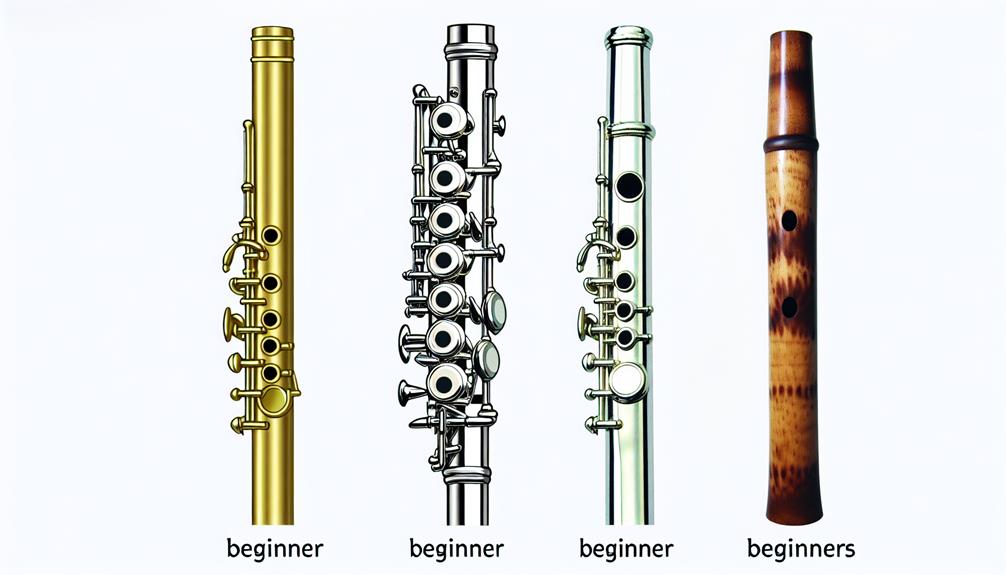When considering the question of whether the flute is challenging to master, one must contemplate the intricate balance of physical, technical, and mental aspects involved in playing this instrument.
The physical demands placed on a flutist, the technical complexities of producing a clear sound, and the mental agility required to navigate intricate musical passages all contribute to the perceived difficulty of mastering the flute.
However, beyond these initial considerations lie deeper insights into the nuanced artistry and dedication necessary to truly excel in flute performance.
Key Takeaways
- Flute playing demands breath control, finger dexterity, and posture for mastery.
- Mental skills like concentration and resilience are essential for overcoming challenges.
- Proper embouchure, breath control, and posture are key to clear tone production.
- Consistent practice, guidance, and focus aid in mastering the flute effectively.
The Physical Demands of Playing Flute
Mastering the flute requires not only musical skill but also a keen awareness of the physical demands involved in producing its melodic tones. Playing the flute entails a delicate balance of breath control, finger dexterity, and posture. Proper breathing techniques are crucial for achieving clear and consistent notes. Flutists must develop strong diaphragm muscles to sustain long phrases and control dynamics effectively. Additionally, the coordination of fingers to cover and uncover the tone holes swiftly and accurately is essential for fluid melody execution.
Maintaining the correct posture while playing the flute is paramount to prevent strain and injury. Flutists must hold the instrument parallel to the ground, supporting its weight with the chin and balancing it with the hands. This position ensures optimal airflow and sound projection. Moreover, regular practice and exercises are necessary to strengthen the muscles involved in flute playing and improve overall endurance.
Technical Challenges for Flute Players
Playing the flute presents technical challenges that demand precision and finesse from musicians. One of the primary technical challenges for flute players is achieving proper embouchure control. The embouchure, the way in which the lips and facial muscles are positioned and used to produce sound, greatly impacts tone quality and intonation. Flutists must develop a strong and flexible embouchure to produce clear and resonant notes across the instrument's range.
Furthermore, mastering finger dexterity is crucial for navigating the flute's complex key system. Flute players must swiftly and accurately coordinate their fingers to cover the tone holes while maintaining a relaxed hand position to facilitate fluid movement. This requires extensive practice to develop muscle memory and agility.
Another technical challenge is breath control. Flute playing demands controlled and steady airflow to produce consistent sound quality. Musicians must learn to take quick, silent breaths at appropriate moments in the music without disrupting the phrasing or rhythm. Developing a strong diaphragm and efficient breathing technique is essential for sustaining long phrases and dynamic contrasts in performance.
Mental Skills Required for Flute
Exhibiting mental resilience and focus is essential for proficient flute performance. Playing the flute requires a high level of mental acuity and concentration. Musicians must maintain focus to produce clear tones, navigate complex musical passages, and execute intricate techniques. Developing strong mental skills is crucial for overcoming performance anxiety, staying motivated during practice sessions, and maintaining composure in high-pressure situations, such as auditions or public performances.
Furthermore, mental resilience plays a significant role in handling setbacks and challenges that may arise during flute practice or performance. Being able to stay calm, adapt to unexpected circumstances, and persevere through difficulties is key to progressing as a flutist. Additionally, cultivating a positive mindset, setting realistic goals, and staying disciplined in practice are all mental skills that contribute to success in flute playing.
Overcoming Common Flute Playing Obstacles
Developing effective strategies to address common obstacles encountered in flute playing is crucial for advancing skills and enhancing overall performance quality. To overcome these challenges, consider the following tips:
- Proper Embouchure: Ensuring the correct positioning of your lips and jaw is essential for producing a clear and resonant tone on the flute.
- Breath Control: Mastering breath control is crucial for sustaining long phrases and achieving dynamic variations in your playing.
- Finger Dexterity: Practice exercises to improve finger coordination and agility, which are vital for playing rapid passages smoothly.
- Posture and Body Alignment: Maintaining good posture and proper body alignment while playing the flute can help prevent fatigue and discomfort, allowing for better focus on technique and musical expression.
Tips for Mastering the Flute
To excel in flute playing, mastering essential techniques and adopting effective practice strategies is paramount. Firstly, establishing a strong foundation by focusing on proper posture and breath control is crucial. Maintaining a straight back, relaxed shoulders, and a steady airflow are key elements that contribute to producing clear and resonant tones. Additionally, developing finger dexterity and coordination through regular scales and arpeggios practice is essential for navigating the flute's complex fingering system with ease.
Consistent and focused practice sessions are vital for mastering the flute. Setting specific goals for each practice session, whether it be improving a challenging passage or working on tone quality, helps maintain motivation and progress. Breaking down pieces into smaller sections and practicing them slowly before gradually increasing the tempo can aid in learning difficult music effectively.
Seeking guidance from a skilled flute teacher can provide valuable feedback and personalized instruction to enhance your playing. Embracing a positive mindset, staying patient, and celebrating small achievements along the way are also important aspects of mastering the flute. Remember, dedication and perseverance are key to reaching your full potential as a flutist.
Frequently Asked Questions
Can Playing the Flute Improve Cognitive Functions or Memory?
Playing the flute can enhance cognitive functions and memory due to the intricate coordination required between hands, breath control, and reading music. The mental focus and multitasking involved stimulate brain activity, potentially improving cognitive abilities.
Are There Specific Health Risks Associated With Playing the Flute for Extended Periods of Time?
Playing the flute for extended periods can lead to health risks like overuse injuries, muscle strain, and posture problems. Proper technique, breaks, and stretching can mitigate these risks, ensuring a harmonious balance between practice and well-being.
How Does Playing the Flute Compare to Playing Other Musical Instruments in Terms of Difficulty?
Playing the flute requires dedication to mastering breath control, finger coordination, and embouchure technique. Compared to some instruments, such as the piano or violin, the learning curve may be considered moderate, but consistent practice is essential for proficiency.
Is It Possible to Learn How to Play the Flute Without Prior Musical Experience?
Embarking on the flute journey without prior musical experience is feasible. Dedication, consistent practice, and guidance from a skilled instructor are key. Embrace the challenge with an open mind, and the melodious rewards will follow.
Are There Any Cultural or Historical Significances Attached to the Flute as an Instrument?
The flute holds significant cultural and historical importance worldwide. From ancient civilizations to modern orchestras, its enchanting melodies have played a pivotal role in various traditions, ceremonies, and musical compositions, showcasing its enduring legacy.
Conclusion
In conclusion, mastering the flute requires dedication and perseverance. The physical demands, technical challenges, and mental skills needed for flute playing can be daunting.
However, with practice and determination, one can overcome common obstacles and excel in playing the flute. Remember, the flute may seem like a mountain to climb, but with hard work, it can be conquered like a lion taming a fierce beast.





